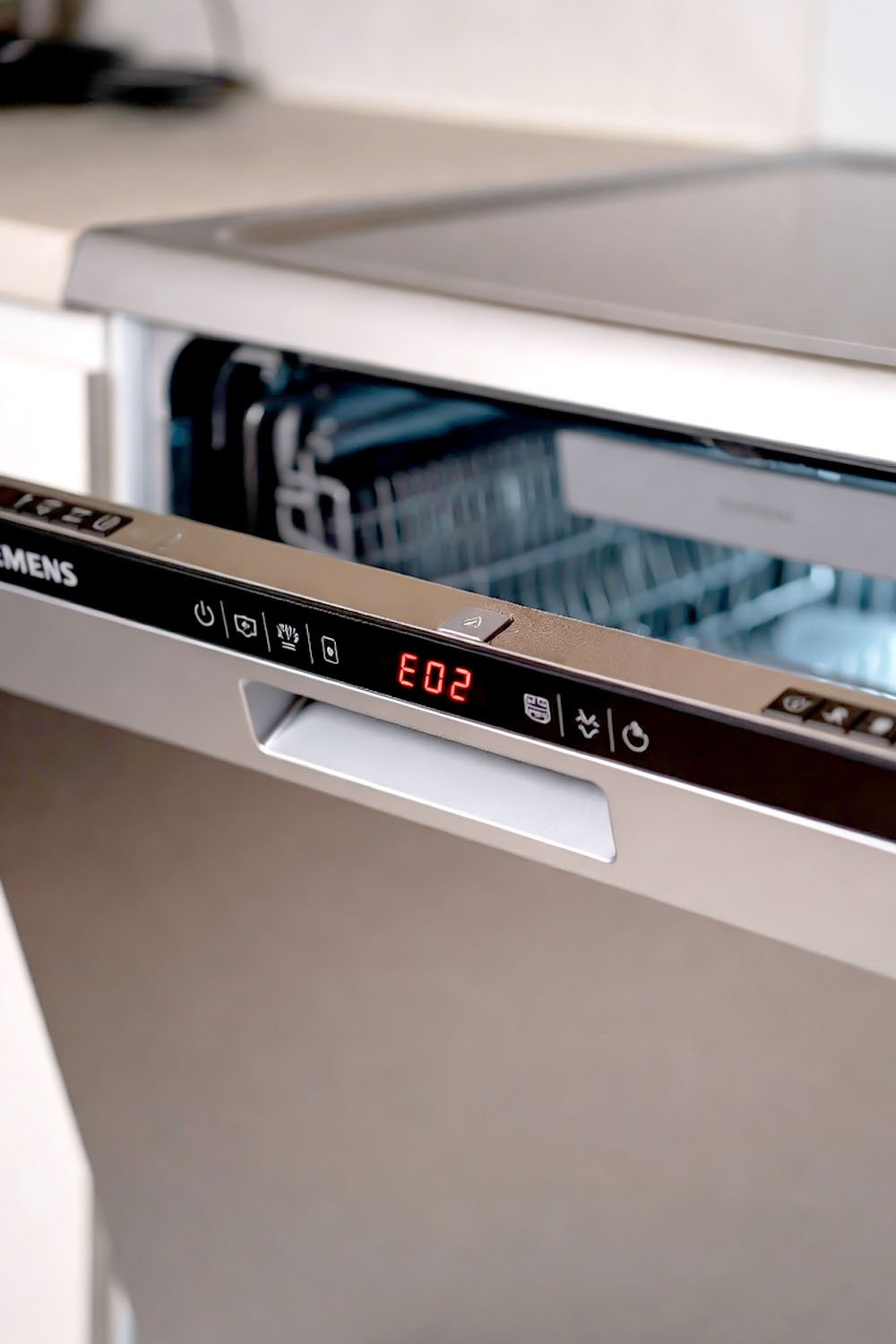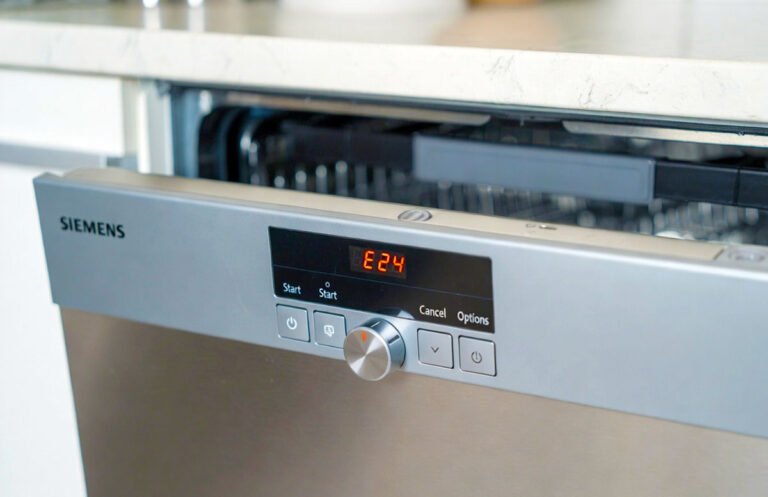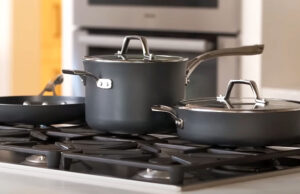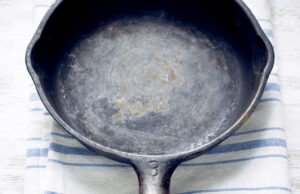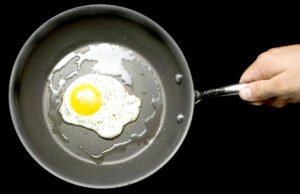As an Amazon Associate, I earn from qualifying purchases at no extra cost to you.
Can You Use Normal Salt in Dishwasher: Expert Advice
You pull out a glass from the dishwasher, and it looks cloudy. You wonder, is it the soap? The water? Or maybe the salt? Many people think of just grabbing normal salt from the kitchen. It feels easy, right? But wait—does it really work that way, or can it ruin your machine? In this article, we will look at what really happens, why it matters, and what you should actually do.
Why Dishwashers Need Salt
Dishwashers are not only about soap and water. They also need salt for one very clear reason: water hardness. Hard water has calcium and magnesium that leave stains and white marks. Salt helps to soften the water and makes the cleaning work better. Without it, you may keep seeing spots on glasses no matter how many times you wash them.
Inside a dishwasher, there is a water softener system. This system needs special dishwasher salt to recharge itself. When the salt goes in, it breaks down the minerals that cause hardness. This process is what keeps your dishes clean and bright. If you skip salt, the softener cannot work well.
Many people confuse dishwasher salt with table salt. But they are very different. Dishwasher salt has larger grains that dissolve slowly. This helps the machine handle the softening process at the right pace. Table salt is too fine, and it may block or damage the system. That is why choosing the right salt is more important than people think.
Also, dishwashers are designed in a way that only dishwasher salt can fit and work smoothly. The compartment for salt is usually near the bottom. Once filled, it slowly releases the salt as the machine runs. If the wrong type of salt is used, the machine can struggle. Over time, this may even lead to costly repairs.
- Salt prevents hard water stains
- It supports the softener system inside
- Dishwasher salt is coarse and slow-dissolving
- Table salt is too fine and risky
- Using the wrong salt may harm your machine
The Difference Between Dishwasher Salt and Table Salt
At first glance, salt looks like salt. White, grainy, and simple. But in reality, dishwasher salt and table salt are not the same. This difference matters a lot. If you mix them up, your dishwasher could suffer damage.
Dishwasher salt is pure sodium chloride with no additives. Its grains are big and slow to melt. That makes it perfect for water softeners. The machine controls how it dissolves. This way, the salt keeps the water soft without harming parts. It is designed with this exact purpose in mind.
Table salt, however, is made for cooking. It often has iodine or anti-caking agents. These small extras are harmless in food but dangerous for dishwashers. They can stick to parts or clog small spaces. Over time, this may reduce cleaning quality. It may also shorten your machine’s life.
Another key point is grain size. Table salt is tiny and quick to dissolve. Dishwasher salt is chunky and much larger. This difference ensures that dishwasher salt works slowly. The machine does not need too much at once. Table salt can dump too much into the system. That overload can hurt the softener unit.
You may feel tempted to use kitchen salt if you run out. It seems cheaper and easier. But this shortcut may cost you later. Even a small clog or buildup can lead to big repair bills. It is better to stick to the salt made for dishwashers only.
- Dishwasher salt has no additives
- Table salt has iodine and anti-caking agents
- Grain size is much bigger in dishwasher salt
- Wrong salt can block or damage softeners
- Using the right one saves your machine in the long run
What Happens If You Use Normal Salt in a Dishwasher
So, what really happens if you pour in normal salt? At first, you might not notice a big problem. The dishes may still look clean for a while. But soon, the issues begin to show.
The fine grains of table salt dissolve too fast. This overloads the water softener with too much sodium. It can make the system unstable. Over time, the softener can stop working as it should. That means more hard water stains and cloudy glasses.
The additives in table salt make things worse. Anti-caking agents are not made for machines. They may build up in the softener tank. Iodine can also leave marks or cause small blockages. Once these build up, the machine may not wash properly.
On top of that, using the wrong salt voids many warranties. Brands clearly state in manuals that only dishwasher salt should be used. If a problem happens and you used table salt, the repair may not be covered. That makes the risk even higher.
Yes, in rare cases, some people use fine salt once or twice with no problem. But this is not safe long term. It is like using the wrong fuel in a car. It may run for a while, but damage is waiting ahead. Always remember that dishwashers are designed for one kind of salt only.
- Normal salt dissolves too fast
- Additives can block or damage parts
- Stains and cloudy marks return quickly
- Warranty may not cover damage
- Dishwasher salt is always the safer choice
How to Add Dishwasher Salt Correctly
Knowing how to add the salt matters almost as much as choosing the right type. Many people rush this part or do it wrong, and that can also cause trouble. Luckily, it is simple once you learn it.
First, open the dishwasher and find the salt compartment. It is usually at the bottom, near the filter. Twist open the cap and check if the chamber has water inside. If it is dry, add a little water before filling it with salt. This helps the salt dissolve properly.
Next, pour the dishwasher salt in slowly. Use a small funnel if you can. That way, you avoid spilling. Spilled salt can cause rust or scratches if it stays inside the machine. After filling, close the cap tightly so no water leaks during the wash.
Do not overfill the compartment. Most dishwashers have a marker or limit line. Stop when you reach that level. Also, remember that the salt compartment is not the same as the detergent one. Mixing them up is a common mistake. Always double-check before pouring.
Finally, keep an eye on the salt refill indicator light. Most dishwashers show a warning when the salt is low. Refill when needed. Do not wait until the machine struggles. A steady supply of salt ensures smoother cleaning every time.
- Find the salt chamber at the bottom
- Add a little water if dry before filling
- Use a funnel to avoid spilling
- Do not mix with detergent compartment
- Watch the refill indicator light regularly
The Risks of Skipping Dishwasher Salt
Skipping dishwasher salt may look harmless. Maybe you think the detergent will handle it. But the truth is, the machine will slowly suffer without it. Hard water will always leave marks behind.
Without salt, minerals like calcium and magnesium stay in the water. They stick to dishes and machine parts. Over time, they form limescale. This scale is hard and crusty, and it blocks spray arms and pipes. Cleaning becomes weaker and slower.
Glassware is the first to show signs. They may look foggy or streaky after washing. Plates and cutlery may also look less shiny. Even if you try different detergents, the problem stays. Salt is the key to preventing this from happening.
Inside the machine, the buildup is worse. Limescale on heating elements makes them less effective. The machine needs more energy to heat water. That means higher bills and slower cycles. In the long run, this shortens the machine’s life.
Many people spend extra money on rinse aids, detergents, or cleaners. But none of these replace salt. The dishwasher softener is built for salt only. If you skip it, the system cannot do its job. This leads to more costs later.
- Minerals stick to dishes without salt
- Limescale blocks spray arms and parts
- Glassware turns foggy and streaky
- Heating elements become less efficient
- No other product can replace salt
Best Alternatives If Dishwasher Salt Is Not Available
Sometimes you may run out of dishwasher salt and cannot find it quickly. So, are there safe alternatives? The truth is, very few options can work well. Still, it is good to know what choices exist.
Some people use special water softening tablets. These are made for dishwashers and can help reduce water hardness. They may not be as strong as real salt, but they can help for a short time. Always check if they are marked safe for your brand.
Others try using bottled soft water. This works only for a few washes and is not practical long term. Carrying heavy bottles each time is costly and tiring. But in an emergency, it can be useful for one or two runs.
One method people ask about is rock salt or sea salt. These are not safe. Even though they look coarse, they often have minerals and dirt inside. This can harm your machine. Always avoid these as substitutes.
The best plan is always to keep extra dishwasher salt at home. It is cheap and lasts a long time. Buying in bulk saves both money and stress. That way, you never have to risk using unsafe alternatives.
- Water softening tablets may work short term
- Bottled soft water is only a quick fix
- Rock salt or sea salt are unsafe choices
- Keeping a backup supply is the best idea
- Bulk buying saves money and worry
Final Thoughts
Normal salt in a dishwasher may look simple, but it creates hidden problems. Dishwasher salt exists for a reason, and it protects both your dishes and your machine. By choosing the right salt and adding it correctly, you save money, time, and stress in the long run. Always use dishwasher salt and avoid risky shortcuts if you want spotless dishes and a healthy machine.
| Type | Safe for Dishwasher | Grain Size | Additives | Long-term Effect |
|---|---|---|---|---|
| Dishwasher Salt | Yes | Large and coarse | None | Protects softener and dishes |
| Table Salt | No | Fine | Iodine, anti-caking | Blocks softener, cloudy dishes |
| Rock Salt | No | Mixed | Impurities | Damages system |
| Bottled Soft Water | Short term | N/A | None | Not practical long term |
| Softening Tablets | Sometimes | Compact | Safe coating | Works short term only |
Frequently Asked Questions (FAQs)
Is it safe to use normal salt if I only do it once?
Using normal salt even once is not safe. The fine grains can dissolve too quickly, and additives may stay inside the softener. While you may not see damage right away, problems can build up slowly. Once the system is clogged, repairs are expensive. Even a single mistake can shorten your dishwasher’s life. It is always better to wait and get real dishwasher salt instead of taking the risk.
Can I use sea salt or rock salt as a replacement?
Sea salt and rock salt may look similar to dishwasher salt, but they are not safe. They often have minerals, dirt, or impurities that can damage the machine. These salts are not cleaned or processed for use in dishwashers. Even if the grains are coarse, they can scratch or block parts. That is why it is always recommended to use only dishwasher salt. Any other type may look fine at first but will cause harm later.
Do I really need dishwasher salt if I live in a soft water area?
If your area has soft water, your dishwasher may not need much salt. However, most machines still recommend using some. This helps keep the water softener healthy and prevents tiny mineral buildup. Without salt, the system may stop working properly over time. Even if you live in a soft water area, it is still best to keep some dishwasher salt inside the machine. It acts like a safeguard for the system.
Is it true that dishwasher salt makes dishes shinier?
Yes, dishwasher salt helps dishes look shinier. It works by softening the water, which prevents spots and streaks. Hard water leaves cloudy marks on glass and dull spots on plates. With salt, the water softener removes those minerals, so the cleaning becomes more effective. While detergent does the cleaning, salt makes sure the water does not ruin the shine. That is why both are needed together for the best results.
Can I mix dishwasher salt with detergent to save time?
No, you should never mix dishwasher salt with detergent. They have different jobs and go in separate compartments. Salt is for the water softener, and detergent is for cleaning. Mixing them can cause the detergent to lose its power and the salt to dissolve in the wrong way. The result may be poor cleaning and possible machine damage. Always keep them separate and use them as directed for the best outcome.
Is it okay to use dishwasher salt in cooking?
Dishwasher salt should never be used in cooking. Even though it is pure sodium chloride, it is not made for eating. It is too coarse and not treated for food safety. Table salt, on the other hand, is safe for cooking and has extra elements that are fine for health. If you use dishwasher salt in food, it will not taste good and may be unsafe. Keep cooking salt and dishwasher salt separate at all times.
Can dishwasher tablets replace dishwasher salt completely?
Dishwasher tablets cannot replace salt completely. Some tablets include built-in water softening features, but they are not strong enough for hard water. Salt works directly with the water softener inside the machine. Tablets cannot do this job fully. In areas with very hard water, skipping salt will lead to cloudy glasses and limescale. Tablets may help a little, but they are not a full substitute. Salt is still needed for the best results.
Do I need to refill dishwasher salt often?
How often you refill depends on how hard your water is and how often you run the machine. In areas with very hard water, you may need to refill every month. In softer areas, it may last longer. The dishwasher usually has a light that shows when salt is low. It is smart to check regularly and refill on time. Keeping the salt filled ensures your dishes stay clean and your machine lasts longer.

